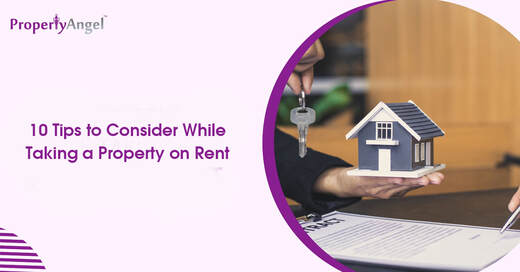|
Do you have a place that you can call 'home'? Before making a selection, there is a big list of things you should look at, including the condition of the apartment, associated charges, and essential paperwork. While the documentation may be taken lightly, the consequences for renters are significantly more serious if some criteria are overlooked. For example, apart from inspecting the exteriors and interiors, a legal check on property ownership is required before renting an apartment. Before getting a property on rent, you must personally visit the property. Examine the furnishing, plumbing, and electrical fittings. As a tenant, it is your right to request the owner to do the necessary repairs or alterations to the property before you move in. Your visit to the property will help eliminate any subsequent miscommunication. Here are 9 Tips to consider while taking a property on rent:1. Keep the Necessary Documents ReadyFor signing a rental agreement, you will need copies of important documents like an adhar card, pan card, passport size photographs, etc. Have all your documents consolidated and ready so that when you finalize a house, you can get the formalities completed at the earliest and move in without a hassle. Keeping all the necessary documents ready in advance is the best approach to avoid back and forth hassles with the landlord. 2. Read the rental agreement document carefully.Before getting a property to rent, carefully study the agreement terms and conditions. Your lease or rental agreement may include a clause that you find objectionable, such as some misprinted data that is extremely important. For example, the monthly rental amount, deposit amount, and the agreement tenure should be verified in the agreement document before signing it. 3. Get Everything in WritingGet everything in writing to avoid disagreements with your landlord before getting a property on rent. Keep copies of every correspondence, and follow up an oral agreement with a letter outlining your agreement. For example, if you ask your landlord for repairs, put your request in writing and preserve a copy for yourself. If the landlord agrees, do get it confirmed from them. 4. Protect Your Privacy RightsAside from disagreements over rental amounts or deposits, one of the most frustrating aspects is the conflict between a landlord's right to enter a rental property without notice and a tenant's right to privacy. It will be simpler to set boundaries with the landlord before getting a property on rent (for example, the landlord must inform you in advance before stopping by). 5. Don't Hesitate to Demand Repairs if NeededKnow your rights to a comfortable rental apartment, and don't give them away. The landlords are obligated to provide decent premises for their tenants to live in, including running water, plumbing, electricity, and clean, hygienic, and structurally safe residence. However, suppose your rental property is not kept in good condition. In that case, you have several options, including withholding some portion of the rent, paying for repairs yourself, and deducting the cost from your rent. 6. Talk to Your LandlordBe honest when communicating with your landlord. If there is a problem, for example, if the landlord is reluctant to make repairs, talk about it to see if it can be handled without resorting to an unpleasant situation before getting a property on rent. 7. See if You Can Get Renters' InsuranceMany people are unaware of renters insurance. A renter's insurance policy protects the loss or damage to the contents of a tenant's home. If an unexpected disaster strikes in your rented house or flat, such as a fire, theft, or another serious incident, rental insurance can help you recover the loss. It will assist you in recovering or replacing all of your assets, furniture, electrical or mechanical gadgets, and even objects of everyday use. Make sure you get renter's insurance before getting a property on rent. 8. Protect Your Security DepositWhile renting a house, a tenant has to pay a security deposit to the landlord, which the landlord returns once the rental agreement expires. To protect yourself and avoid misunderstandings, make sure your lease or rental agreement specifies how security deposits are used and refunded, including permissible deductions before getting a property on rent. When you move in, conduct a walk-through with the landlord to address any existing damage to the property on a move-in statement or checklist. 9. Make Sure the Property is Safe to Live in Before getting a property on rent, see whether your building and area are safe and what your landlord will do if they aren't. Assess the property's vulnerability to the criminal entrance, and check whether criminal occurrences have happened there or anywhere in the neighbourhood. If a crime is very likely, your landlord must take precautions to safeguard you by installing safety doors and grills on the windows. Some Common Questions Tenants Have:When Is Rent Due?A landlord can have a renter pay rent on any day of the month. For example, a landlord may require rent to be paid on the 1st or 5th of each month, regardless of when the renter moved in. However, rent is due on the first of the month. In many places, if the due date falls on a weekend or a legal holiday, the rent is due the next business day.
2 Comments
An excellent blog post entitled "Tips to Consider While Taking a Property on Rent" provides helpful advice for anyone starting the process of renting a house. It is a very pertinent and approachable resource due to its well-structured framework, useful advice, and real-world examples. This blog is a comprehensive guide that will certainly help you in making informed decisions and finding the ideal rental property, whether you are a first-time tenant or someone with prior rental experience. I wholeheartedly endorse this blog to anyone looking for knowledgeable guidance on the rental process.
Reply
Leave a Reply. |
Archives
February 2024
Categories |


 RSS Feed
RSS Feed